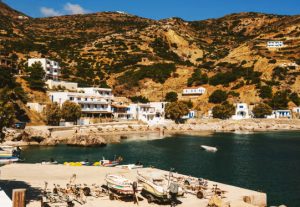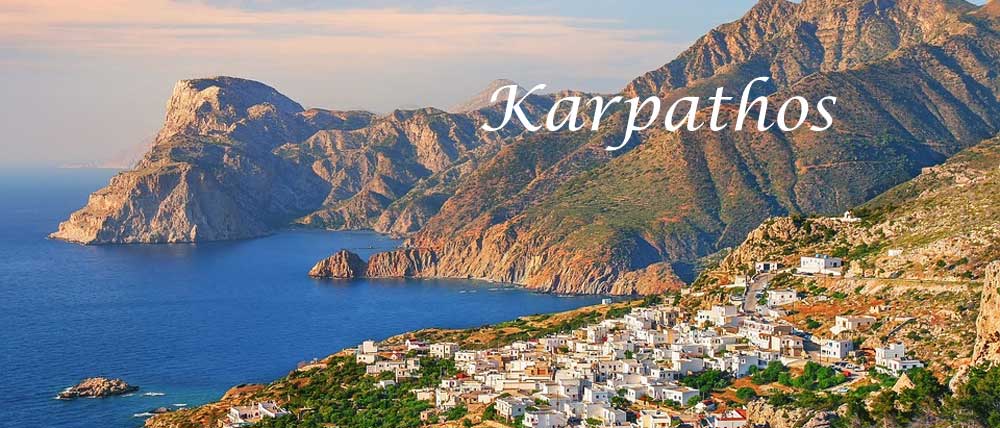The village of Spoa in Karpathos

Studying the possible linguistic considerations regarding the origin of the name, one can easily understand the need for the place to stand out and have its own path in space and time.
According to the archaeologist Ioannis Volanakis, the probable area of origin of the settlement is the area of the settlement’s winery, Agios Nikolaos. The researcher believes that Spoa was built by the inhabitants who lived around the Eftabatousa church, but frequent raids by pirates, starting from the 7th century, forced them to move the village up the mountain to its current location.
Much has been written about the affinity with the nearby village of Mesochori, which in fact was a single Municipality until 1869, however the passionate Spoiites document the issue differently, they have concluded that Spoa comes from “e-spoda” which means the places, the locations, located down, to the south. In fact, with the same name we find on the island an area under the Prophet Elias mountain towards Ahata, on a cape, but also the southern part of Saria which is also called Espoa Saria.
The Spoitian researcher-writer Ilias Vasilaras claims that the village was essentially the southern extension of the ancient city of Vroukountas. To support his point of view, he also refers to a related ancient inscription found in the mills, the entrance to the current settlement.
However, the professor of Modern Greek language Kostantinos Minas (originally from Olympus), with his observations on the subject (regarding Spoa), considers that residents of the Marathos settlement, Eftabatousa, had united and cohabited with residents of another coastal city, Lefkos, ” in the natural fortress of Mesochori from where in the 19th century they began to relocate to the lowland area of Spoon”.
The traveler will not dwell on the origin of the name, he will prefer the essence of the moment, so a walk from this mountain village is one of the fixed recommended excursions.
About 350 houses and 100 people are still today Spoa, four traditional cafes, beautiful narrow streets full of scents of flowers and memories. In the summer there are dozens of open houses, because even though the Stoites migrated thousands of kilometers away, mainly to America and Australia, they faithfully kept their ancestral customs and traditions, what distinguishes them is hospitality with its pure ancient Greek meaning.
Spoa was hit very hard by immigration, the first aliens of the village found themselves from the beginning of the last century in the hardest jobs, from the dams of Penteli to the deepest mines, the coal mines in America!
But not only did their place not disappear, but it was kept alive and today it is a unique example, since even the next generations return and try to bring back memories and overcome the wild, like a paver, passage of time.
As soon as we take a breath, at the entrance of the village we are welcomed by the stone windmills, symbols of a different era, the ruins remind us of remnants of memory, while one of them, cared for with too much love, continues to work as in his youth and waits for the Karpathian wheat to it turns it into flour!
There on the ridge of the mountains is the point where one can gaze at the island from both sides, especially at the moment when the sun retreats tiredly, the surrounding mountains bow down and dress in its sweetest orange color. Then the Vunaros, as is the name of the mountain directly above the village, looks mysterious and at the same time so humane and friendly!
Spoa is also proud of its port, Agios Nikolaos, its beautiful sheltered bay and its beaches are capable of seducing all the senses.
To be the sea reminiscent of spring water? so clean and transparent is it ready to drink in handfuls or is it the landscape and the two pebbly beaches that remind you of an oasis on the last pure edge of the world?
In Agios Nikolaos, globalization has not made a dent, a few rooms and a restaurant blend harmoniously with the peace of a nature that is calmed by the human touch.
Panagia Eftabatousa is located in Agios Nikolaos, the harbor of Spo. It is an early Christian Basilica of the 5th century, which had a wooden and ceramic roof and was destroyed together with the settlement most likely after the 7th century.
Tradition says that Panagia Eftabatousa owes its name to the seven entrances, the “seven entrances” it had, so they say it was very impressive and this was the central church, one of the four of the Marathos settlement.
The visitor will also tour the Roman early Christian baths, the best preserved baths in all of the Dodecanese.
